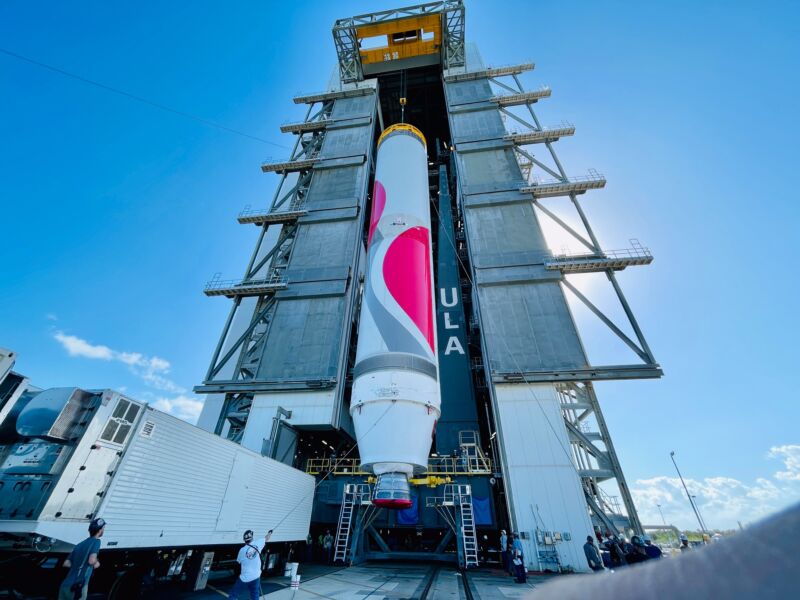
United Launch Alliance
The large Vulcan rocket, which has received dozens of launch orders from the US Department of Defense and Amazon for its Project Kuiper megaconstellation, is due to make its debut at some point this year. But when?
In response to a query from Ars, a spokesperson from the rocket's primary customer, Astrobotic, said the mission is targeted for a launch during the first quarter of 2023, i.e., before the end of March. A spokesperson for Vulcan's manufacturer, United Launch Alliance, did not specify a time frame, saying a launch date would only be set after additional testing was completed.
While there is no official launch date, some interesting clues have turned up in the last week or two, and it's therefore possible to make an educated guess. With much work left to do before the heavy-lift rocket takes flight from Cape Canaveral, Florida, a reasonable target for a no-earlier launch date is May 2023.
The payload
Like most large rocket projects, Vulcan's debut has been delayed by a few years. There are two main drivers of the delay for this mission, which is known as Cert-1 (this stands for "certification flight-1," meaning it's the first of two demonstration flights before the rocket is certified to carry payloads for the US Department of Defense). For Vulcan, the delays have been occasioned by the payload and the rocket's main engines.
Last week, Astrobotic announced that its Peregrine lander had successfully completed its entire flight acceptance campaign. "Peregrine is now ready to be shipped to Cape Canaveral, Florida when Astrobotic’s rocket provider, United Launch Alliance, gives the green light to receive it," the company stated. This was important news—except it didn't quite tell the whole story.
This release made it sound like Astrobotic simply needed to ship the lander from Pittsburgh to the launch site, where it would be installed on the rocket. However, the lander's engines, which have been undergoing extensive testing in White Sands, New Mexico, are still not ready for flight and are not yet attached to the lander. The company plans to complete the integration of the engines onto the lander at the launch site in Florida.
Engines are obviously a critical part of the spacecraft. Asked if Peregrine's engines have completed testing and have been certified for flight, Astrobotic spokesperson Alivia Chapla would only say, "Astrobotic’s Peregrine is currently on schedule and will be conducting final engine integration."
Peregrine's engines were developed by Frontier Aerospace and use new technology intended to demonstrate a lighter and less expensive means of in-space propulsion. This likely has necessitated extra testing.
The rocket
United Launch Alliance finally took delivery of the main engines for the Vulcan rocket, two BE-4 engines built by Blue Origin, during the fall of 2022. Since then, the company bolted these engines onto Vulcan's core stage and shipped this vehicle and its Centaur upper stage from its factory in Alabama to the launch site.
This hardware is undergoing pre-launch processing, after which Vulcan will be put through a series of flight readiness verification tests. This includes multiple tanking tests and a wet dress rehearsal, culminating in an engine flight readiness firing. "We will set a launch date following successful completion of the flight readiness tests," United Launch Alliance spokesperson Jessica Rye told Ars.
Assuming these tests go well—certainly not a given, but United Launch Alliance has carefully prepared for these activities and has decades of operational experience—Vulcan will be ready for payload integration of Astrobotic's lander, two Project Kuiper test satellites, and a commercial payload from Celestis. The timing may hinge on Peregrine's engines.
There are other timing constraints as well. United Launch Alliance has a very important upcoming launch for NASA and Boeing. About a week ago, NASA confirmed that the first crewed flight on Boeing's Starliner spacecraft will launch on an Atlas V rocket in April. Because United Launch Alliance's Atlas V and Vulcan rockets will share a launch pad at Cape Canaveral, Space Launch Complex-41, this critical human spaceflight will probably take place before Vulcan.
This very likely pushes the debut of Vulcan into May. The readiness of Peregrine, and progress made during Vulcan's testing, may push that date later into the year.
